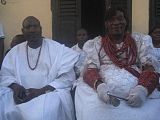The Igogo festival is a Yoruba festival unique to Owo, Nigeria. It is a series of events typically held annually on September in Owo, Ondo State, southwestern Nigeria to honor Queen Oronsen, a mythical wife of Rerengejen, a legendary King of the ancient Owo Kingdom.[1]
It is a colorful festival in which the incumbent Olowo of Owo and high chiefs of Owo Kingdom dresses like a woman coupled with brass ornaments and coral beads with plaited hair like women to celebrate and pay homage to Queen Oronsen at "Ugbo Laja" and "Ugbo Oluwa" in appreciation of her protection.
[2]
During this festival, Olowo dressing reflects that of Oronsen and her wealth and myth.
The festival often lasts for seventeen days, during which no nobody is allowed to wear cap in the case of men and head ties in the case of women and the beaten of drum is usually forbidden during this period.[3]
History
The Igogo festival began in 1601 AD, during the reigned of Olowo Rerengejen, following the departure of Oronsen, a beautiful and affluent queen who was the most loved wife of Rerengejen, a powerful king and hunter.[4]
Rerengejen met Oronsen in a forest while hunting as usual and asked for her hands in marriage. This beautiful queen agreed to marry the king provided certain terms and conditions are met. Rerengejen was enchanted by her beauty and promised to adhere strictly to her rules.[5]
Queen Oronsen insisted on certain taboos, things she must not see that people should not do in her presence, either accidentally or intentionally.[6]
She insisted that nobody should grind Okra in her presence or pour water into the yard. In addition, anyone arriving from the farm must not lump a load of firewood. The taboo is a negation of the common domestic activities in the palace.[7]
King Rerengejen promised that none of these rules will be violated and the Queen agreed to marry him. King Rerengejen caution the other wives not to carry out any of these activities and this warning provided a clue of her taboos.[8]
Although, Oronsen has married many powerful Kings who probably do not fulfill similar promises after a trial.
Queen Oronsen has a mystical power to produce quality beads which enhanced King Rerengeje's riches and affluence. This led to the King placing much values on her than the senior wives, who were all jealous of the adoration and love by Rerengejen.[9]
One day, Queen Oronsen had a minor rift with the other senior wives of the King. They conspired against her with the intention to violates her taboo which they intentionally did while Rerengejen was not in the palace. The confrontation resulted in an immediate vacation of the palace.[10]
While she was running out of the palace, some palace guards and chiefs ran after her to bring her back to the palace, an effort that was futile.[11]
She later felt tired and waited at a place called "Ugbo Laja" where she was persuaded to returned to the palace and her refusal frustrated the guards to capture her with force but she disappeared into "Igbo Oluwa", now a sacred forest, leaving her head ties (oja) at "Ugbo Laja" which the guards returned to King Rerengejen. "Ugbo Laja" is now a sacred grove.[12]
Queen Orosen terra cotta sculptured image from "Igbo Oluwa" by Ekpo Eyo stood at a distance to informed the Owo people that nothing will bring her back to the palace but annually, they should always sacrifice two hundred items of different articles, such as dried fish, kolanut, Aligator pepper, bitter cola and many more for ritual (Igogo) and in returned she promised to protect the Kingdom.[13]
The people of Owo, led by King Rerengeje promised to follow are instruction and this marked the birth of the "Igogo festival".
The drama behind Queen Oronsen's departure from the palace and the sacrifice at the sacred grove, "Ugbo Laja" is the basis of the Igogo festival.[14]
Chronology of events
The festival is often held at the middle of September but sometimes it could be held before September.[15]
On the first day of the festival, certain men called "Ayooyo" of the Iloro quarter of Owo from the lineage of the guard that returned Oronsen's head ties to King Rerengejen dresses in black Ofi (a traditional attire) with a long stick and Cow hoof, dances round the town, following a visit to the palace. Before the day runs out, they must visit "Ugbo Laja" to pay homage to Queen Oronsen.[16]
On day two of the festival, the incumbent Olowo will send a sheep to "Ugbo Luwa" through Chief Obata and Obajo, who will eventually end the festival in the last day of the events.[17]
During the festival, the incumbent Olowo of Owo visits "Ugbo Laja" to pay homage to the goddess, Queen Oronsen. There he will declared that "I, Olowo, your progeny has come to pay homage to you with your requested item. Let know war invades Owo, let no epidemics visits Owo". This is the only day the Olowo of Owo will publicly uncovered his head and he does not wear his crown throughout that day.[18]
Following the King's visitation, on different day within the festival period, each of the high Chiefs will dress in feminine and parade themselves around the town in honor of the goddess.[19]
On a day before the end of the festival, the incumbent King will dance round the town in feminine dressing with members of his cabinet and wives. His wives called the "Yeye" and the followers will praise him with is acolytes, saying "Owa me di la ni o", meaning, the king his pregnant, "Okun Aragbarigbi", meaning the mighty Ocean. This praise is in relation to Queen Oronsen, the mythical goddess.[20]
On the seventeenth day of the festival, Chief Obata and Obajo will now dance round the town in feminine dressing as well and this marked the end of the festival for that year.[21]






